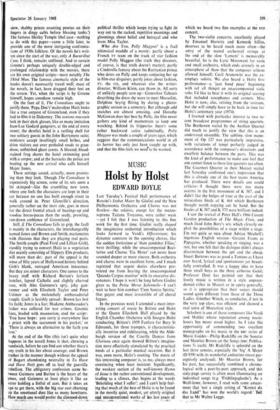Hoist by Hoist MUSIC
EDWARD BOYLE
Last Tuesday's Festival Hall performance of Rossini's Stabat Mater by Giulini and the New Philharmonia Orchestra and Chorus was not flawless—the soloists, except for the mezzo- soprano Tatiana Troyanos, were rather weak —yet I felt that I was listening to this fine work for the first time. Giulini really shaped the imaginative orchestral introduction which looks forward to Verdi's Offertorium; his dynamic contrasts in the opening chorus, like the sudden fortissimo at 'clum pendebat Filius,' were thrilling; while the unaccompanied Reci- tative and Chorus `Eia Mater' can never have sounded deeper or more sincere. Both orchestra and chorus were in excellent form, and I much regretted that urgent duties elsewhere pre- vented me from hearing the unaccompanied `Quando Corpus manitur' with its evocative dis- sonances. I hope it won't be long before Giulini gives us the Petite Messe Solennelle—I can't wait to hear him conduct 'Cum Sancto Spiritu,' that gayest and most irresistible of all choral fugues.
In the previous week I attended a most inter- esting concert of music by Britten and Holst at the Queen Elizabeth Hall played by the English Chamber Orchestra with Imogen Hoist conducting. Britten's 1959 Fanfare for Bury St Edmunds, for three trumpets, is characteristic- ally inventive and exhilarating, while the Alde- burgh version of the Courtly Dances from Gloriana once again showed Britten's imagina- tion most effectively stimulated by the practical needs of a particular musical occasion. But it was, even more, Hoist's evening. The music of this interesting composer is, to me, always most convincing when least insistent. Significantly, the weakest section of the well-known Hymn of Jesus is the rather conventional development, leading to a climax., that begins at the words 'Beholding what I suffer'; and I can't help feel- ing that much of the best of Hoist is to be found in the mostly quiet, modest, yet utterly original and =Conventional works of his last -years of
which we heard two fine examples at the ECO concert.
The two-violin concerto, excellently played by Emanuel Hurwitz and Kenneth Sillito, deserves to be heard much more often—the entry of the muted orchestral strings at the end of the slow 'Lament' is memorably
beautiful. So is the Lyric Movement for viola and small orchestra, which ends serenely in an atmosphere of thaw that the composer seldom allowed himself; Cecil Aronowitz was the ex- empla,ry soloist. We also heard a Hoist first performance—a 'jazz band piece' beginning with (of all things) an unaccompanied viola solo; I'd like to hear it with its original scoring- that included saxophones and cornets. Miss Hoist is now, alas, retiring from the rostrum, but she will simply have to be back in time for Holst's centenary year (1974).
I listened with particular interest to two re- Cent broadcast programmes of string quartets. The Beethoven recital by -the Aeolian Quartet did much to justify the view that this is an underrated ensemble. The sublime slow move- ment of Op 127 was particularly impressive, with variations of tempi perfectly judged in accordance with the composer's directions and excellent balance between the parts. This was the kind of performance to make one feel that one cannot listen to these late quartets too often. The Guarneri Quartet in their Mozart recital last Saturday confirmed one's impression that this is already one of the best teams America has produced. There were details one could criticise—I thought there were too many accents in the first movement of K 387, and I didn't like the bulges of tone at the start of the miraculous finale of K 464 which Beethoven thought worth copying out by hand. But the finales of K 387 and K 575 were brilliant indeed.
I saw the revival of Peter Hall's 1966 Covent Garden production of The Magic Flute, and much liked John Bury's sets which cleverly ex- ploit the possibilities of a stage within a stage. I'm not quite so sure about Adrian Mitchell's ingenious English version—Geraint Evans as Papageno, whether speaking or singing, was a riot, but one felt that the dialogue didn't always discriminate between the apt and the cheap. Stuart Burrows was as good a Tamino as I have ever heard, lyrical and spontaneous yet beauti- fully controlled. It was a happy idea to have three small boys as the three airborne Genii; Professor Dent has pointed out that their lovely music is written in a style unprece- dented either in Mozart or in opera generally, so it is appropriate that their voices should sound quite different from those of the Three Ladies. Gunther Winch, as conductor, if not in The very top class, was efficient and showed a real sense of Mozartian style.
Schubert is one of those composers like Verdi and Mahler whose reputation among music- lovers has never stood higher. So I take this opportunity of commending two excellent monographs on his music in the BBC series of Music Guides—Philip Radcliffe on the Sonatas and Maurice Brown on the Songs (nic Publica- tions 5s each). Mr Radcliffe is splendid on the last three sonatas, especially the 'big' A 'Major (D 959) with its wonderful andantino (most per- ceptively analysed). Mr Maurice Brown, for his part, has successfully combined a chrono- logical with a poet-by-poet approach, and this sixty-page survey is often most illuminating on individual songs (e.g. `Frtffilingsglaube'). As a Wolf-lOver, however, I read with some amaze- ment that 'not a single setting of "Kennst du das -Land" has won the world's regard.' Tell that to Mr Walter Legge.


































 Previous page
Previous page